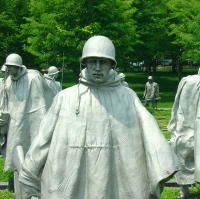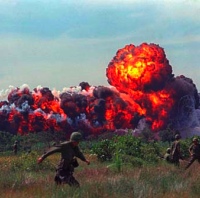- About Us
- Columns
- Letters
- Cartoons
- The Udder Limits
- Archives
- Ezy Reading Archive
- 2024 Cud Archives
- 2023 Cud Archives
- 2022 Cud Archives
- 2021 Cud Archives
- 2020 Cud Archives
- 2015-2019
- 2010-2014
- 2004-2009
 |
From The Cud Archives -February 2010: |
It’s difficult for contemporary Americans to believe that wars do stop- eventually, when one side or both runs out of human and material resources. It’s the scars of war that remain.
When military historians trace the growth of war against civilian populations, they point to Sherman’s Civil War Atlanta Campaign (184) as its starting point – the genocidal destruction of an enemy’s land, people and economy. South Carolina was the hardest hit: ‘War is hell,’ Sherman famously said. His rampage there reverberates in the shout of an elected representative from South Carolina who called the President of the United States a liar a few months back. Acceptance of ‘total war’ led to the fire bombings of Dresden, Hamburg and Tokyo – to Hiroshima and Nagasaki.
Then Korea, where a UN-sponsored unification voted was blocked by the U.S (as in Vietnam later). We backed the dictator Syngman Rhee (corrupt, like Karzai) who, before ‘embracing democracy,’ had been a collaborating functionary during the racist occupation of Korea by Japan. In the north, Kim Il Sung had led partisan groups fighting the Japanese. Today his son clings to nukes (justified fear?) and 50,000 U.S troops remain in expensive residence in the South.
The theatrical Gen. MacArthur brooked no interference from the United Nations, putative overseer of the war, from the chief of staff in Washington, nor from President Truman himself in carrying out his ‘scorched earth ’ war policies in both North and South Korea. Our national press was less subservient to the military back then. Here is a report by George Barrett, a front-line correspondent for The New York Times, published on Feb. 9, 1951. It describes a village near Anyang in South Korea:
’ war policies in both North and South Korea. Our national press was less subservient to the military back then. Here is a report by George Barrett, a front-line correspondent for The New York Times, published on Feb. 9, 1951. It describes a village near Anyang in South Korea:
A napalm raid hit the village three or four days ago when the Chinese were holding up the advance, and nowhere in the village have they buried the dead because there is nobody left to do so. This correspondent came across one old woman, the only one who seemed to be left alive, dazedly hanging up some clothes in a blackened courtyard filled with the bodies of four members of her family.
The inhabitants throughout the village and in the fields were caught and killed and kept the exact postures they had held when the napalm struck- a man about to go on his bicycle, 50 boys and girls playing in an orphanage, a housewife, strangely unmarked, holding in her hand a page torn from a Sears-Roebuck catalog. There must be almost 200 dead in the tiny hamlet.
Amazing, all of it done without drones too.
Memories –and scars- are being created today as well, especially among the world’s 1.5 billion Muslims. We have invaded two of their countries –Iraq and Afghanistan- and fund wars against two more of their national entities, Palestine and Somalia. President Obama thought to make a new start, but with Congress still the roost of war hawks and the all-powerful lobby of expansionist Israel, makes little headway. Hope, like Gen. MacArthur, just fades away.
